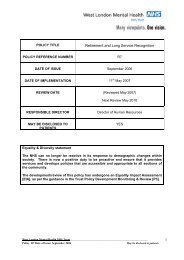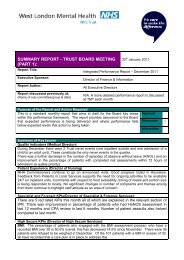Annual report 2012-13 - West London Mental Health NHS Trust
Annual report 2012-13 - West London Mental Health NHS Trust
Annual report 2012-13 - West London Mental Health NHS Trust
Create successful ePaper yourself
Turn your PDF publications into a flip-book with our unique Google optimized e-Paper software.
“For their own benefit andthat of their patients, mentalhealth staff should haveaccess to regular, high quality,clinical supervision.“Steve Shrubb, chief executiveClinical supervision – supportingstaff to support their patientsClinical supervision is key to helping mentalhealth staff cope with job-related stress andwe know from research evidence that it canimprove patient care, reduce sickness absencerates and boost staff wellbeing and morale.Following a national conference on clinicalsupervision hosted by the trust in 2011, weagreed to launch a new programme, aimedat ensuring that nurses and occupationaltherapists have regular access to evidencebased,high quality clinical supervision.Creating a dialogue with staffWe know from our surveys that staff feel theydon’t know enough about our key strategicpriorities, nor about the wider <strong>NHS</strong> policies thatinfluence us. They also told us that they feeldisengaged from senior management.In response, chief executive Steve Shrubb hasincreased publication of his blog to staff, awell-read update on issues facing the trust, toonce a week. And, because we want to improvecommunications with all our stakeholders, it’savailable on the website too.“The tone is positive,” explains Steve. “But itdoesn’t shirk difficult discussions about whereimprovement is needed.”Our monthly listening events, held in differentlocations around the trust, give staff the chanceto hear directly from the chief executive what ishappening, give their views and put any questionsthey might have to the executive team.Diversity adviser joins the trustThe trust is working to strengthen the way itmeets the needs of all our service users, carersand staff through a new post of diversity adviser.Jane Gaffa, who has a background as a clinician,has initially focussed on meeting the diversityneeds of service users, while providing adviceand guidance to staff.Already the diversity unit has produced a rangeof tools to help clinicians provide care that isappropriate to the particular service user, including:• Guidance on dealing with sexuality.• A video produced in conjunction with thegender identity clinic, on caring for trans-genderservice users.• A tool-kit on the culture, customs, and religiouspractices of some of our largest communities.• Working with the trust’s spirituality & pastoralcare department and IT specialists on a spiritualassessment tool (HOPE), to help staff ask usersabout religion and spirituality.• Organised a conference in conjunction withCentral and North <strong>West</strong> <strong>London</strong> to raiseawareness of the issues faced by the Tamilcommunity in accessing mental health servicesand reduce stigma associated with mentalillness in the Tamil community.Diversity training itself has been revamped thisyear with a renewed focus on the patient.Jane said: “I have only been in post for ashort while, but I am already impressed by thefoundations which are in place. Working withinan atmosphere of positive change is very uplifting,as is the trust’s renewed commitment to progressequality for service users’ and staff.”We have also introduced the ManchesterClinical Supervision Scale to enable us tomonitor the programme in terms of benefits tostaff wellbeing and patient outcomes.The programme began with an evaluation ofclinical supervision at the trust. The informationwas used by the project team, which includesinternational experts in the field, to design anew policy to strengthen clinical supervision sothat it reflects the latest research evidence andour own findings.This year, we have added extra listening eventsspecifically for staff from black and minorityethnic (BME) communities. The aim is toimprove engagement with BME staff and helpto improve representation at senior levels withinthe trust.“For their own benefit and that of theirpatients, mental health staff should have accessto regular, high quality, clinical supervision,”said chief executive Steve Shrubb. “The aim isfor all nurses and occupational therapists tohave training in clinical supervision so that wecan embed the process throughout the trust.”22<strong>Annual</strong> Report <strong>2012</strong>/20<strong>13</strong>23

















